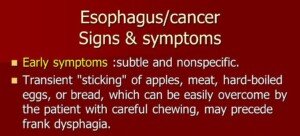
Has your voice been hoarse recently, you googled this and discovered that it can be a symptom of esophageal cancer?
That’s frightening enough without also learning, through an online search, that a hoarse voice can be caused by ALS (amyotrophic lateral sclerosis).
However, more likely than ALS, it can also be caused by cancer of the larynx (voice box).
Esophageal cancer definitely can cause a hoarse voice – though this is not a foremost symptom of this disease.
How does esophageal cancer cause hoarseness?
“Hoarseness is a symptom caused by a cancer of the esophagus in the neck (the cervical esophagus) or upper thoracic esophagus, growing outside the esophagus and invading the recurrent laryngeal nerve, causing paralysis of one of the vocal cords,” explains Alex Little, MD, a thoracic surgeon with a special interest in esophageal and lung cancer.
Dr. Little adds, “This is an ominous sign and heralds an advanced tumor.”
This hoarseness will not come and go, unlike the hoarseness from common acid reflux or LPR (laryngopharyngeal reflux).
It will always be there because the tumor, which is encroaching upon the laryngeal nerve, is always present and in a fixed location as it grows.
Now, if you had esophageal cancer advanced enough to invade the laryngeal nerve, you’d also have other symptoms of the disease.
The hallmark symptom at this stage would be difficulty getting food down, once it’s swallowed beyond your throat.
You’d feel it getting stuck or built-up somewhere below the throat, as it gets blocked by the tumor.
If the tumor within the esophagus is big enough, none of the food will get past it. Instead, it’ll come back up in the form of regurgitated matter.
A secondary symptom to this would be unintentional weight loss, plus switching to soft foods to get food down.
Due to malnourishment you’d also be feeling weak or not well.
Have any of these things been happening to you along with your hoarse voice?
If your only symptom is a hoarse voice, and especially if you’re not a smoker or drinker (smoking and drinking are risk factors for esophageal cancer), then it’s extremely unlikely – very extremely – that you have this rather uncommon disease.
What about a cough with the hoarse voice?
Esophageal cancer can cause a cough. This would not necessarily be related to the hoarse voice.
Dr. Little says, “Cough is usually due to aspiration of regurgitated food either irritating the vocal cords or finding its way into the trachea.”
The cough would not be like randomly clearing one’s throat throughout the day or feeling a need to cough a little before speaking (and that kind of pre-speech cough is likely due to acid reflux).
Instead, it would be associated with eating.
Any persistent hoarse voice and/or cough requires medical attention, especially if there are other concerning symptoms.

 Alex Little, MD, trained in general and thoracic surgery at the Johns Hopkins University School of Medicine; has been active in national thoracic surgical societies as a speaker and participant, and served as president of the American College of Chest Physicians. He’s the author of “Cracking Chests: How Thoracic Surgery Got from Rocks to Sticks,” available on Amazon.
Alex Little, MD, trained in general and thoracic surgery at the Johns Hopkins University School of Medicine; has been active in national thoracic surgical societies as a speaker and participant, and served as president of the American College of Chest Physicians. He’s the author of “Cracking Chests: How Thoracic Surgery Got from Rocks to Sticks,” available on Amazon.
 Lorra Garrick has been covering medical, fitness and cybersecurity topics for many years, having written thousands of articles for print magazines and websites, including as a ghostwriter. She’s also a former ACE-certified personal trainer.
Lorra Garrick has been covering medical, fitness and cybersecurity topics for many years, having written thousands of articles for print magazines and websites, including as a ghostwriter. She’s also a former ACE-certified personal trainer.
.


























